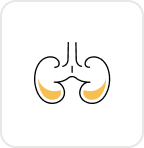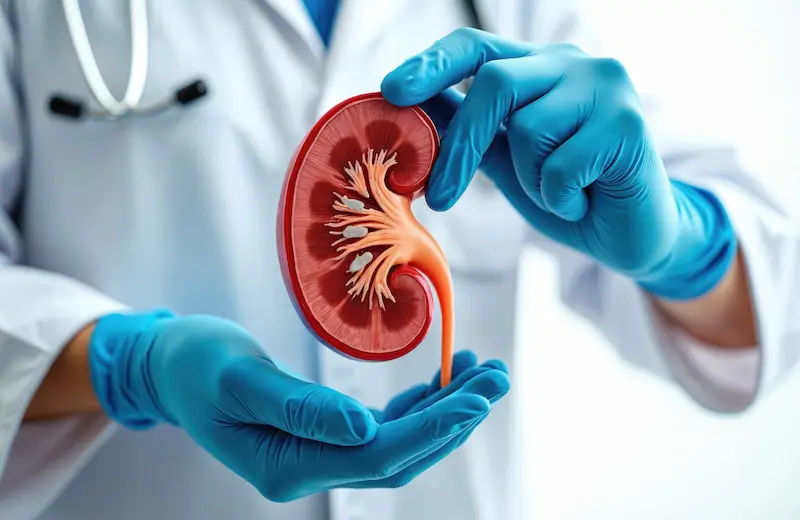Bacterial Infection Symptoms: Know When to See a Doctor
Learn to recognise the signs of a bacterial infection, understand how they differ from viral illnesses, and know when to seek medical help. Explore symptoms, diagnosis, treatments, and prevention tips.

Written by Dr. D Bhanu Prakash
Reviewed by Dr. Dhankecha Mayank Dineshbhai MBBS
Last updated on 13th Jan, 2026

Introduction
Your body is a fortress, and most of the time, its defences are impeccable. But sometimes, microscopic invaders breach the walls. Bacterial infections are a common cause of illness, ranging from a minor skin irritation to a life-threatening condition. Recognising the signs of a bacterial infection is the first critical step towards getting the right treatment and preventing complications.
This guide will walk you through the general and specific symptoms, how these infections differ from viral ones, and most importantly, when it is time to seek professional medical help. Understanding these signals empowers you to take charge of your health and make informed decisions.
What is a Bacterial Infection?
Understanding bacterial infections begins with knowing the role bacteria play in our lives.
Bacteria: Friends and Foes
Not all bacteria are harmful. In fact, trillions of beneficial bacteria call your body home, primarily in your gut, aiding in digestion and protecting against harmful pathogens. A bacterial infection occurs when disease-causing bacteria multiply in the body and trigger an immune response. These pathogens can enter through cuts, be inhaled, ingested via contaminated food or water, or transmitted through contact.
How Infections Take Hold
An infection succeeds when bacteria overcome the body’s natural defences. They reproduce rapidly, releasing toxins that damage cells and cause inflammation. The specific symptoms of a bacterial infection you experience depend on the type of bacteria involved and the area of the body under attack.
Consult Top Doctors for Your Symptoms
General Signs and Symptoms of a Bacterial Infection
While symptoms vary, your body often sends out general distress signals when fighting a significant bacterial invasion.
1. The Classic Systemic Response: Fever and Chills
A fever is one of the body’s most powerful weapons. By raising your internal temperature, your immune system creates a less hospitable environment for bacteria. Chills often accompany a fever as your body works to reach its new, higher set point. A persistent fever, especially one over 38.3°C (101°F), is a classic sign of bacterial infection.
2. Localised Signs: Redness, Swelling, and Pain
If the infection is localised, such as a cut or wound, the area will often become red, warm, swollen, and tender to the touch. This inflammation is the result of increased blood flow, sending white blood cells to the site to combat the invaders. Pus—a thick, white or yellow fluid—is a tell-tale sign, consisting of dead bacteria, tissue, and immune cells.
3. Fatigue and Gastrointestinal Upset
Feeling unusually exhausted is common as your body diverts energy to fight the infection. Gastrointestinal symptoms like nausea, vomiting, and diarrhoea are also frequent, particularly with foodborne bacterial illnesses caused by pathogens like Salmonella or E. coli.
Symptoms by Infection Location
The location of the infection dictates the specific symptoms you might notice.
1. Respiratory Tract Infections
These are among the most common illnesses, affecting the nose, throat, and lungs. While they often start with mild symptoms like cough or congestion, some infections can become more serious if left untreated.
- Pneumonia: Productive cough (with green or yellow mucus), high fever, shortness of breath, chest pain.
- Strep Throat: Severe sore throat, pain when swallowing, white patches on tonsils, swollen lymph nodes in the neck, and usually no cough.
- Sinusitis: Facial pain and pressure, thick yellow or green nasal discharge, congestion, and headaches.
2. Skin Infections
When harmful microorganisms enter through cuts, bites, or irritated skin, infections can develop. These range from minor irritations to more severe conditions that may require medical care.
- Cellulitis: A painful, red, and swollen area of skin that feels hot and spreads rapidly.
- Impetigo: Common in children; presents as red sores that burst and develop a honey-coloured crust.
- Folliculitis: Inflamed hair follicles appearing as red bumps or white-headed pimples.
3. Urinary Tract Infections (UTIs)
A UTI often causes a strong, persistent urge to urinate, a burning sensation during urination, passing frequent small amounts of urine, and cloudy or strong-smelling urine. Pelvic pain is also common.
4. Gastrointestinal Infections
Often caused by contaminated food or water, these lead to symptoms like watery diarrhoea, abdominal cramps, nausea, and vomiting. In severe cases, dehydration can quickly become a complication.
Bacterial vs. Viral Infection: How to Tell the Difference?
This is a common point of confusion, but the distinction is vital.
Key Differentiating Factors
Telling a bacterial infection from a viral one can be tricky, as the symptoms often overlap. However, certain clinical features and diagnostic clues help doctors identify the underlying cause and guide appropriate treatment.
- Symptom Duration: Viral symptoms often improve within a few days to a week. Bacterial infection symptoms can persist longer and frequently worsen over time.
- Mucus Colour: While not foolproof, thick, green or yellow mucus is more often associated with bacterial infections, while clear or white mucus is more common with viral ones.
- Fever Pattern: A high-grade fever that spikes is more typical of a bacterial infection, whereas a low-grade fever is common with viruses.
Why the Distinction is Critical for Treatment
The most important reason to differentiate is treatment. Antibiotics are effective against bacteria but useless against viruses. Misusing antibiotics for viral infections contributes to the global crisis of antibiotic resistance, making these crucial drugs less effective for everyone.
How Are Bacterial Infections Diagnosed?
If you suspect a bacterial illness, a doctor will use several methods for diagnosis.
The Role of Physical Examination and Medical History
Your doctor will ask about your symptoms, their duration, and severity. They will also perform a physical exam, checking your vital signs and examining the affected area (for example, listening to your lungs, looking at your throat, or inspecting a skin wound).
Laboratory Tests: Cultures, Blood Tests, and Imaging
To confirm a bacterial cause, tests are often needed:
- Culture: A sample (for example, throat swab, urine, blood, or pus from a wound) is sent to a lab to grow and identify the bacteria.
- Blood Tests: A complete blood count (CBC) can show elevated white blood cells, indicating infection. Blood cultures can detect bacteria in the bloodstream.
- Imaging: X-rays or CT scans can help diagnose infections such as pneumonia.
- For accurate diagnosis, Apollo24|7 offers convenient home collection for tests like CBC and cultures, ensuring you get the answers you need without a lab visit.
Get Your Health Assessment Done
Common Treatments for Bacterial Infections
Treatment depends on the type and severity of the infection.
1. The Power of Antibiotics
Once diagnosed, bacterial infections are typically treated with antibiotics. These are prescribed based on the type of bacteria involved. It is crucial to take the exact antibiotic your doctor prescribes.
2. The Crucial Importance of Completing Your Prescription
Even if you start feeling better after a few days, you must finish the entire course of antibiotics. Stopping early can leave the strongest bacteria alive, allowing them to multiply and cause a drug-resistant reinfection.
3. Supportive Care at Home
Alongside medication, rest, hydration, and over-the-counter pain relievers such as paracetamol or ibuprofen can help manage symptoms and support recovery.
When to Seek Immediate Medical Attention
Certain symptoms of a bacterial infection are red flags that require urgent care. Seek immediate medical attention if you or someone else experiences:
- A fever exceeding 39.4°C (103°F) or lasting more than three days.
- Difficulty breathing or shortness of breath.
- Confusion, dizziness, or a severe headache.
- A skin rash that spreads quickly.
- Persistent vomiting or inability to keep fluids down.
- Symptoms that dramatically worsen or do not improve after starting antibiotics.
If any of these severe symptoms appear, consult a doctor online immediately with Apollo24|7 for urgent evaluation or proceed to the nearest emergency room.
Preventing Bacterial Infections
Prevention strategies focus on hygiene and lifestyle habits. Wash your hands frequently with soap and water. Practise food safety by cooking meats thoroughly and avoiding cross-contamination. Keep wounds clean and covered. Ensure you and your family are up to date on vaccinations, as some prevent serious bacterial diseases such as tetanus, whooping cough, and pneumococcal pneumonia.
Conclusion
Recognising the signs of a bacterial infection is essential for protecting your health and preventing complications. While your immune system can handle many everyday threats, it is important to know when an infection requires medical attention. Persistent or worsening symptoms, particularly high fever, confusion, or breathing difficulties, should never be ignored. Accurate diagnosis ensures you receive appropriate treatment, including antibiotics when necessary, while also helping to avoid misuse. If you are unsure about your symptoms, err on the side of caution and consult a doctor through Apollo24|7 for timely, professional guidance tailored to your needs.
Consult Top General Physicians
Consult Top General Physicians

Dr Syed Mateen Pasha
General Physician
2 Years • MBBS
Bengaluru
PRESTIGE SHANTHINIKETAN - SOCIETY CLINIC, Bengaluru

Dr. Vivek D
General Physician
4 Years • MBBS
Bengaluru
PRESTIGE SHANTHINIKETAN - SOCIETY CLINIC, Bengaluru

Dr Aakash Andgi
General Physician/ Internal Medicine Specialist
9 Years • MBBS MD
Bengaluru
Apollo Clinic, JP nagar, Bengaluru

Dr. Anand Ravi
General Physician
2 Years • MBBS
Bengaluru
PRESTIGE SHANTHINIKETAN - SOCIETY CLINIC, Bengaluru

Dr. Harshendra Jaiswal
General Physician/ Internal Medicine Specialist
12 Years • MBBS , MD (General medicine)
Kolkata
108 DHANA DHANVANTARI Clinic, Kolkata
(25+ Patients)
Consult Top Doctors for Your Symptoms

Dr Syed Mateen Pasha
General Physician
2 Years • MBBS
Bengaluru
PRESTIGE SHANTHINIKETAN - SOCIETY CLINIC, Bengaluru

Dr. Vivek D
General Physician
4 Years • MBBS
Bengaluru
PRESTIGE SHANTHINIKETAN - SOCIETY CLINIC, Bengaluru

Dr Aakash Andgi
General Physician/ Internal Medicine Specialist
9 Years • MBBS MD
Bengaluru
Apollo Clinic, JP nagar, Bengaluru

Dr. Anand Ravi
General Physician
2 Years • MBBS
Bengaluru
PRESTIGE SHANTHINIKETAN - SOCIETY CLINIC, Bengaluru

Dr. Harshendra Jaiswal
General Physician/ Internal Medicine Specialist
12 Years • MBBS , MD (General medicine)
Kolkata
108 DHANA DHANVANTARI Clinic, Kolkata
(25+ Patients)
More articles from General Medical Consultation
Frequently Asked Questions
How long does a bacterial infection usually last?
The duration depends on the type and location of the infection and whether it is treated with appropriate antibiotics. With treatment, many common bacterial infections start to improve within 48 to 72 hours. However, it is essential to finish the entire antibiotic course, which may last 7 to 14 days, to prevent recurrence.
Can a bacterial infection go away on its own?
Some mild bacterial infections can be cleared by the body’s immune system without antibiotics. However, it is often difficult to predict which ones will resolve. Letting an infection run its course risks it becoming more severe. It is always best to get a doctor’s opinion to assess the need for treatment.
What are the first signs of a bacterial skin infection?
The first signs of a bacterial skin infection often include redness, warmth, swelling, and tenderness in a specific area. The skin may feel painful to the touch, and you might see a pustule or pus-filled blister. The redness may also spread over time.
What is the most common bacterial infection?
Some of the most common bacterial infections include urinary tract infections (UTIs), strep throat, certain types of pneumonia, and skin infections such as cellulitis and impetigo. Foodborne illnesses from bacteria like E. coli and Salmonella are also widespread.
How can I tell if my cough is bacterial?
A cough caused by a bacterial infection in the respiratory tract is often “productive”, meaning it brings up thick, yellow, green, or even rust-coloured mucus. It is typically accompanied by other symptoms like fever, chest pain, and shortness of breath, and it persists or worsens over time rather than improving. A doctor can confirm with an exam or tests.






